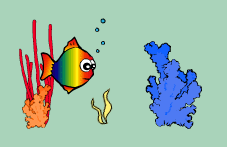|
|
Little Rainbow Fish lived with his father and mother at the bottom of the sea. Every day, Father Fish and Mother Fish went out to get food. Little Rainbow Fish was bored at home. He had nothing to do! "Father, I am bored," he said to his father. "Go out and have a swim," said Father Fish. "Mother, I am bored," he said to his mother. "Go and play with the water," said Mother Fish. Little Rainbow Fish said, "Let's play football." "But we don't have legs!" cried Father Fish. Little Rainbow Fish said, "Let's play basketball." "But we don't have hands," cried Mother Fish. Little Rainbow Fish said, "Let's go cycling!" "But we don't have bicycles!" cried Father Fish. Little Rainbow Fish said, "Let's have a barbecue." "But we cannot build a fire in the sea!" cried Mother Fish. Little Rainbow Fish was very unhappy. " I want to have some fun, something that we can do together." His parents said, "Let's think together." Finally, Little Rainbow Fish said, "Let's go fishing!" Father and Mother cried out together, "But we are fish!" |
 |
|
| (Boys and girls, what can Little Rainbow Fish and his parents do?) | |||
| At that time, his
friend Little Red Lobster came in. "Hello, Little Rainbow Fish, how are you?" he said. "I'm unhappy and bored. I have nothing to do and nothing to play with," he said. "Oh! I know what we can do! We can play hide-and-seek in the beautiful corals over there!" Little Red Lobster said cheerfully. Little Rainbow Fish and his parents shouted, "What a good idea!" They all played hide-and-seek happily among the corals. Little Rainbow Fish was bored no more! |
|||
| This story is recommended for KS2 pupils. | |
| The lesson plan is just to give you a brief example and it is for reference only. You may not find all the details in this lesson plan. |
| a. | |
| b. |
Task Description |
| c. |
Materials |
| d. | Procedures |
| 1. | Teacher asks pupils what they do in their free time. Some of the vocabulary in the story can then be introduced. | |
| 2. | Teacher introduces the main character, namely, Little Rainbow Fish and his parents, and his friend Little Red Lobster. | |
| 3. | Pupils are asked to predict what the story is about after they are shown the title of the story. | |
| 4. | Teacher reads the story to the pupils or pupils can read the story silently on their own. | |
| 5. | Teacher can discuss with pupils why all the activities in the story are no good for Rainbow Fish. Also, they may be asked to tell how they would solve the problem if they were Little Rainbow Fish. | |
| 6. | Pupils are then asked to complete the story by supplying an ending to the story by suggesting an activity that the Fish family can do together. They can do this as a whole class activity when teacher solicits suggestions or they can work in small groups of 4 when they come up with a few activities. Teacher puts all these suggestions on the board. | |
| 7. | Teacher, together with the whole class, can decide on the best activity for the Fish family. | |
| 8. | After that, pupils can practise reading/role playing the story with expression in groups of 4 or 5: Little Rainbow Fish, Father, Mother, Lobster & Narrator. | |
| 9. | Pupils are then asked to rewrite the story using another animal instead of Rainbow Fish as the central character. The vocabulary and the language patterns used in this story can be re-used with some modifications. This can be done as a class activity or as homework. | |
| 10. | Some good samples of pupils' work are selected for reading aloud in the next lesson. | |
| 11. | They may use their own stories to produce radio plays as a follow-up oral activity. |
| e. |
Assessment Pupils may be assessed on
|